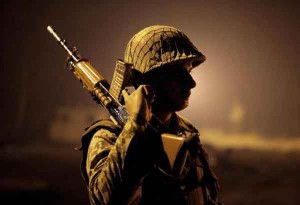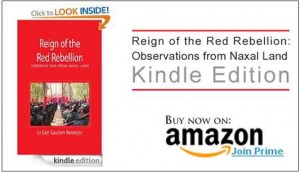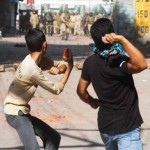IDR Blog
The thinking man and the fighting man

People sleep peaceably in their beds at night only because rough men stand ready to do violence on their behalf.
The date, May 23, 2013, may well go down in the history of the Indian republic as a day when the first rays of a new dawn began to shed light on the culture of barren strategic thought within the national security establishment. On this day, the prime minister of India laid the foundation stone for the proposed Indian National Defence University at a two-hundred-acre site in Binola village, on the outskirts of the national capital. The idea of the university is one that had been hanging fire for four decades, then given a push after the Kargil Review Committee’s recommendations and finally given conceptual shape by a committee chosen and guided by Arun Singh, a strategic mind rarely associated with the political corridors of South Block. The committee, chaired by noted strategist, K. Subrahmanyam, submitted its report to the defence minister in 2001.
…this along with the distrust between civilian-run ministries and the armed forces, had also undermined military effectiveness by contributing to a procurement system that was dysfunctional.
As if to mock the indifference with which the Indian electronic media treated this historic event, on this very day, the president of the United States of America was making the first major counter-terrorism address of his new term in office, laying down new policy guidelines. The forum he chose was none other than the US National Defence University at Fort McNair, Washington, from where presidents have enunciated important national security policy objectives in the past. The difference in the approach to strategic security between what is arguably the oldest, and the largest democracies in the world — which consider themselves to be natural allies — could not have been starker.
The Economist, in a recent article titled “India as a great power: Know your own strength”, highlighted the fact that on gaining independence, the Indian political elite, which had a strong pacifist bent, was determined to keep the generals in their place and succeeded in doing so. The cost of this success was that India exhibited a striking lack of what might be called a strategic culture and its political class showed little signs of knowing or caring about how the country’s military clout should be deployed. According to the article, this, along with the distrust between civilian-run ministries and the armed forces, had also undermined military effectiveness by contributing to a procurement system that was dysfunctional.
It was the late George K. Tanham, a strategic analyst, who, after a comprehensive study — which included numerous interviews with Indian thinkers, policymakers and those in the armed forces — produced a monograph, “Indian Strategic Thought: An Interpretive essay”. This US government-funded research project was published by the internationally respected US think tank, Rand Corporation, in 1992. Tanham’s broad conclusion that India always suffered and continues to suffer from a lack of strategic thinking drew the attention of many strategic writers nationally and internationally and elicited considerable debate at that time. But the cocooned Indian security establishment was not listening.
In this sombre background, the message emanating from Binola must gladden the hearts of a small tribe of students of national security, whose future otherwise was destined to follow that of the vanishing Indian tiger. During the foundation laying ceremony, Air Chief Marshal Norman Anil Kumar Browne, the current chairman of the Chiefs of Staff Committee, said that there is a need to cultivate and develop a select cadre of policy advisors and politico-military thinkers, who, through their operational experience, academic record and application of domain knowledge, can conceptualize and formulate national strategy as well as provide critical analysis in areas of joint responses to varied security threats.
Speaking at the occasion, the prime minister reflected on the security challenges and opportunities and said that these should prompt a reorientation of our strategic thinking and a reappraisal of our higher defence organization. He exhorted defence professionals to remain abreast of the complex challenges we face and the avenues that are available as a result of the enormous transition taking place in India. He said that he was reminded of a late 19-century observation by General Sir William Francis Butler that “The nation that will insist upon drawing a broad line of demarcation between the fighting man and the thinking man is liable to find its fighting done by fools and its thinking by cowards”.
Can we see a cadre of civil servants who specialize in national security issues and contribute accordingly?
The prime minister further said that the Indu would ensure that our country, our government and our armed forces benefit from the best military advice that is available and will provide an avenue for our soldiers to think beyond the physical art of warfare. It would also allow our thinkers and policy-makers to understand the complexities of war and conflict. It will provide our defence professionals with a deep understanding of the interplay between all attributes of national power.
And finally, being conscious of the recent scandals that have accompanied defence procurement and resulted in monumental delays in the modernization of the armed forces, the prime minister said, “We have also been guided by the objective of making our defence acquisition transparent, smooth, efficient and less vulnerable to unethical practices. We will continue to seek the highest standards of probity in defence acquisition.” Implicit in this observation was the distrust between civilian-run ministries and the armed forces that ultimately undermines military effectiveness, as was eluded to in The Economist article.
Whilst writers and commentators have for long been pleading for the realization of many of the sentiments expressed on the occasion, it is the first time that we hear a COSC calling for a select cadre of policy advisors and politico-military thinkers, of the formulation of national strategy and of the joint responses to varied security threats. This is far removed from the distinct compartmentalization that exists in the national security domain between the elected representatives and the bureaucracy on the one hand and the uniformed fraternity on the other.
It also signals a departure from inter service turf battles within the military, covering not just roles and missions but every conceivable pie that needs to be shared. Perhaps the very thought of a dedicated university for national security practitioners where thinkers, advisers, planners and doers all think and conceptualize for the nation’s future is an idea that softens the hearts of even the toughest of warriors.
Precisely because national security is a neglected subject, finding the ‘right staff’, especially among both the civil and uniformed fraternity, is going to be far more challenging…
This is for the national good. But more importantly, it is what the prime minister has had to say that must be music to the ears of those who genuinely cherish the goal of India taking its rightful place amongst the comity of nations by inculcating amongst our security practitioners a strategic mindset from which will flow strategies to build national power. Does, for example, one find the hope of a revamped higher defence organization, one where there is no dividing line between the civilian policymaker and the military professional, where the armed forces’ headquarters do not remain isolated pockets outside of the ministry of defence but become integral to it? Do we see a political consensus developing over the concept of a permanent chairman, Chiefs of Staff? Can we see a cadre of civil servants who specialize in national security issues and contribute accordingly? Will there be greater integration between the MoD, the armed forces and external affairs? Will the armed forces begin to practice joint warfare rather than pay lip service to jointmanship? These and many tantalizing thoughts come to mind from the extremely forward-looking speech that the prime minister made at the foundation laying ceremony.
It is possible that being an intellectual and thinker in his own right, leaving the politics and the grind of the capital behind as his convoy sped along National Highway 8 towards Binola, Manmohan Singh the Doctor, could in his imagination picturize a campus, better than what he has seen anywhere in the world, where academics, soldiers, thinkers and administrators breathe the free air of a university campus and use their collective intellect for the larger good of national security, and where, to use Rabindranath Tagore’s words, “the clear stream of reason has not lost its way into the dreary desert sand of dead habit…” Who knows, he may even have imagined himself post-retirement, browsing in the Indu library, engaging in serious discussions with students and faculty alike or war-gaming, all in the academic environs of Binola!
To those tasked with the mission of bringing the Indu to fruition by 2018, as announced by the defence minister, the easy bit comprises setting up the campus, buildings and associated issues. The bigger challenge is to organize and plan for the software, namely the faculty and the academic content. Precisely because national security is a neglected subject, finding the ‘right staff’, especially among both the civil and uniformed fraternity, is going to be far more challenging and this includes finding a meritorious president. One hopes that to lay strong foundations, the organizers will have a free hand in finding the right people. Equally, much needs to be done to encourage more academics and uniformed officers to gravitate towards national security studies.
As the prime minister’s motorcade retraced its way to Delhi, agents of the status quowithin the system, both civil and military, must already have been planning to nip in the bud the message of change that emanated from Binola. One can only hope that those who were part of this historic and auspicious beginning and who spoke with conviction and optimism to the nation from Binola, will strive to put every word spoken into practice, failing which, the nation will be condemned to continue with its fighting being done by fools, and its thinking done by cowards.
Courtesy: The Telegraph
Post your Comment
2 thoughts on “The thinking man and the fighting man”
 Loading Comments
Loading Comments





Saw the valour of Indian Soldiers on TIMES NOW yesterday, where they were braving fire of militants, and the channel juxtaposed the Political class braving each other to gain brownies over brazenness.
Where will the MORALE be? Has anybody measured the same – ever??? We have emulated at last the US on INDU – great job! Fruition in 2018?? What till then when Chinese adventurism looms large on the horizon? Relations with Pak festering eversince independence and nineties.
Better late then never! It is true that national security both internal and external are neglected in country of ours. Foreign policy and defence policy are in tandem or otherwise god knows, but results are glaring, we have not been able to keep desirable relationship with our other neighbours other then China and Pak. We need to change our mind-sets. Just seen an interesting Chinese proverb in one of your articles that if you want to be rich build roads, likewise if we want to be strong we need to build the roads between our minds, be it civil or army or army/navy/air force. I was also a bit surprised when air force had some issues with army`s operation air wing? Be whatever we are the need of the hour is national interest with common mind sets!